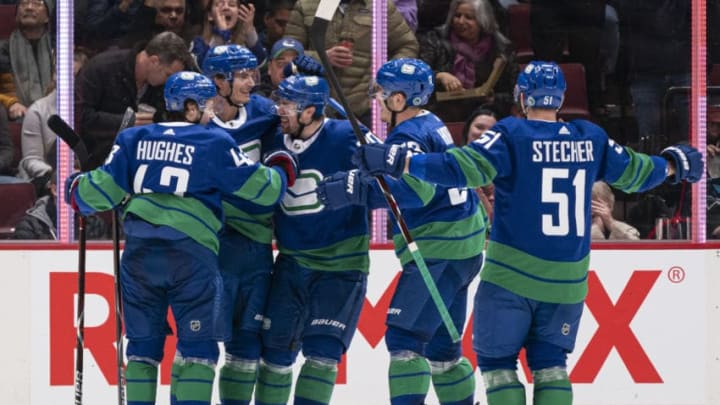The NHL season has been on pause, but talk of resuming the season has ramped up. Here is why hub cities are a great idea for the Vancouver Canucks.
NHL commissioner Gary Bettman has made it extremely clear that he has no intention of cancelling the 2019-2020 season. A lot of ideas have been circulating around, but the main idea is that there will be designated cities in which hockey will be played.
These cities are called “hub-cities” and it needs to be able to sustain all the players, coaches, and team personnel for multiple months. If this is the route the NHL chooses to use when they resume the season, it will be a big help for the Vancouver Canucks.
It has been no secret that the Canucks have one of the most brutal travelling schedules in the NHL. West coast teams not only travel the most, but also have to deal with constant time zone changes that can affect the players’ rhythms.
This has been such a big problem for the Canucks that they actually implemented Fatigue Science, which is aimed at studying the players’ sleep habits to build the most effective schedule for flying and training. For example, if the team slept poorly that night, they might push back their travel time to give their players more chance to rest and cut practice short.
Canucks legend Daniel Sedin explained this back in June 2011, via NHL.com:
"“They look at all the guys, how they’re sleeping, and it shows if you should stay over in a city or fly right after the game,” Daniel Sedin told NHL.com. “It works especially if you’ve been on a four- or five-game road trip. It really decides if we’re going to stay over and fly the next day, or fly right after the game.”"
Back in the 2011 playoffs, the Canucks played the Chicago Blackhawks, Nashville Predators and the San Jose Sharks. Chicago is almost 2,200 miles away from Vancouver, Nashville is over 2,500 miles, and San Jose is over 800 miles.
The Canucks had to travel back and forth from all the cities just to reach the Stanley Cup Final, where they faced the Boston Bruins, who are approximately 25,00 miles away.
On the other hand, the Bruins played the Montreal Canadiens (approx. 300 miles), the Philadelphia Flyers (approx. 300 miles) and the Tampa Bay Lightning (approx. 1,100 miles) before they faced off against the Canucks.
According to Bleacher Report, “the 2011 Stanley Cup Finals matchup between the Boston Bruins and Vancouver Canucks is the longest distance between two cities in Cup Finals history.”
After the Cup is awarded, people start to find out all the injuries that various players were battling through. In 2011, Ryan Kesler was playing through a hip injury, and Henrik Sedin was fighting through a back problem. Imagine how tough it was for these players to be hurting all over prior to boarding a long flight.
Constant travel is seen as part of the gig, but with the season on hold and people staying at home, the sudden shift to constant plane rides will be jarring — especially as they’re quickly adjusting back to game speed. With hub cities, teams will be in the same area for months. No one will need to travel, and no team will be put at an advantage or disadvantage because of the geography of their city.
The players may say that they’re used to the constant travel and long plane ride, but it does take a mental and physical toll on the body. The Canucks are consistently top 10 in the league in miles traveled but with hub cities, this drawback will be taken away.
It will be fascinating to see how this new format impacts both veteran and young players alike. Will it speed up recovery? Will it take away the fatigue factor? It will be interesting to see if the Canucks can take advantage of this unique opportunity, should Vancouver be awarded a hub city.
